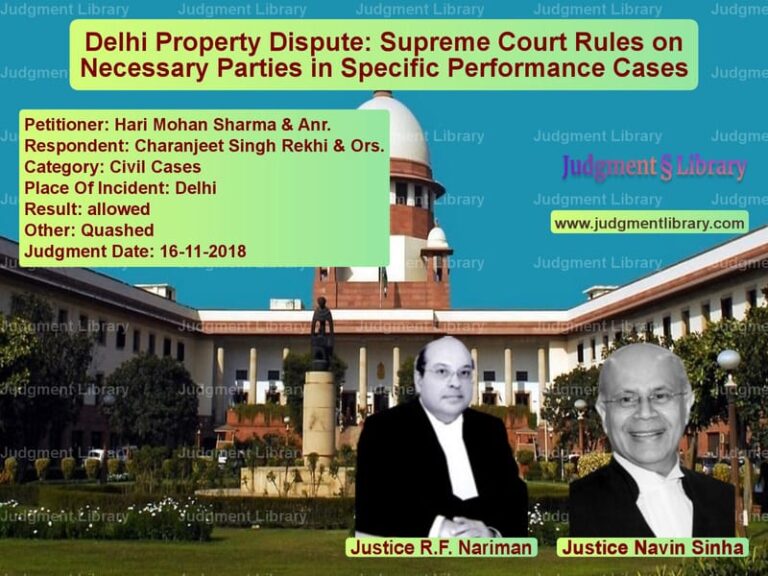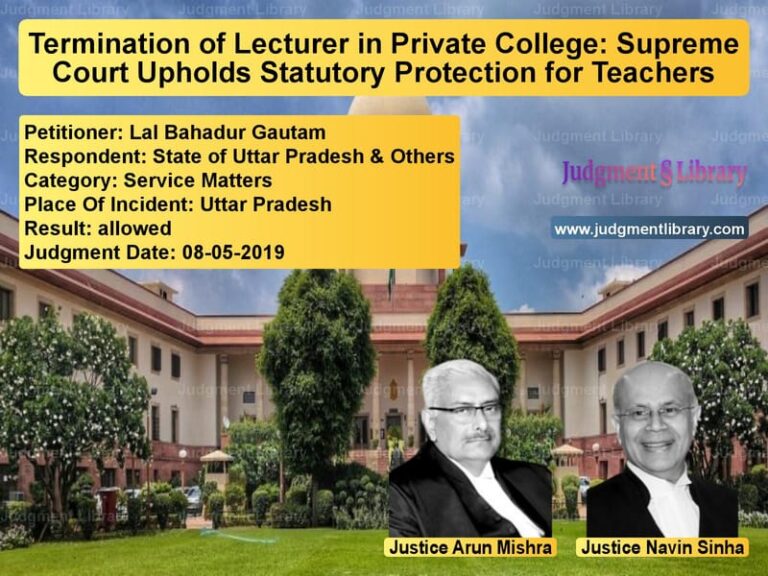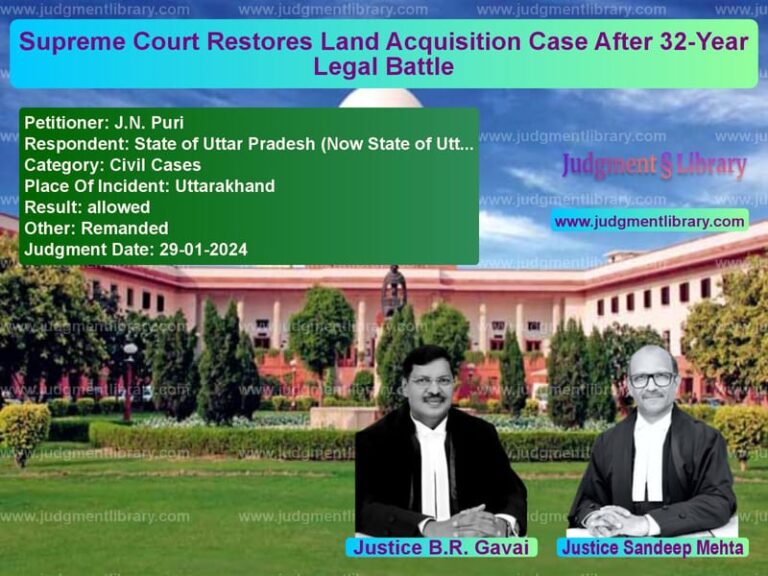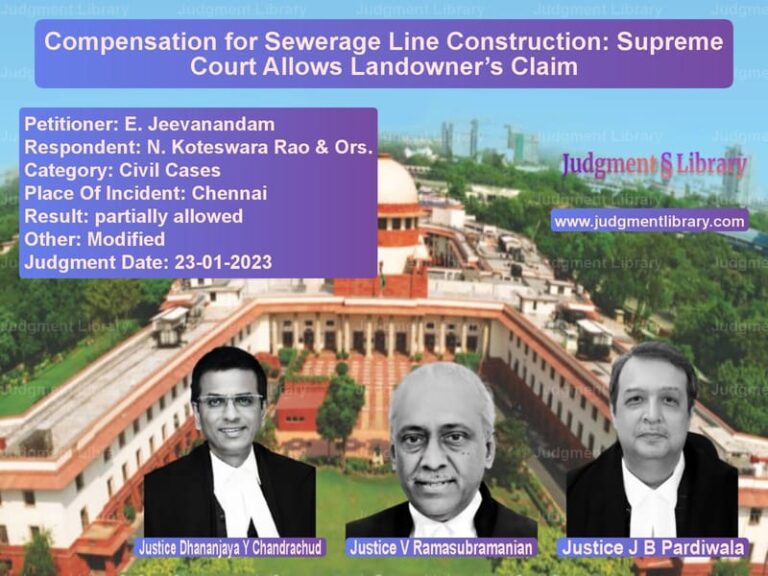Supreme Court Acquits Man in Kidnapping and Rape Case Due to Lack of Evidence
The Supreme Court of India, in the case of Tilku alias Tilak Singh v. The State of Uttarakhand, overturned the conviction of the appellant under Sections 363 and 366 of the Indian Penal Code (IPC). The judgment emphasized that the prosecution failed to prove that the prosecutrix was a minor at the time of the alleged incident and that she had willingly accompanied the appellant. The ruling reinforces the principle that courts must assess the evidence of consent and age before convicting under kidnapping and abduction laws.
Background of the Case
The case involved the alleged kidnapping of a 14-year-old girl from village Koti, Uttarakhand, by the appellant, Tilku alias Tilak Singh, along with his father and another accused. According to the prosecution:
- On February 7, 1994, the prosecutrix was on her way to purchase salt from a neighboring village when she was allegedly kidnapped by the appellant and two others.
- The prosecutrix’s father reported her missing on February 13, 1994.
- After an investigation, the police found the prosecutrix and the appellant living together in Dehradun.
Trial Court’s Verdict
The Trial Court convicted the appellant under:
- Section 376 IPC (rape) – 7 years of rigorous imprisonment and a fine of ₹4,000.
- Section 366 IPC (kidnapping a woman to compel marriage) – 5 years of rigorous imprisonment and a fine of ₹2,000.
- Section 363 IPC (kidnapping a minor) – 3 years of rigorous imprisonment and a fine of ₹1,000.
The co-accused were acquitted due to lack of evidence.
High Court’s Judgment
The Uttarakhand High Court partly allowed the appeal, acquitting the appellant under Section 376 IPC but maintaining his conviction under Sections 363 and 366 IPC. The High Court reduced the sentence to:
- 2 years of rigorous imprisonment under Section 363 IPC.
- 3 years of rigorous imprisonment under Section 366 IPC.
The appellant then approached the Supreme Court, challenging the High Court’s decision.
Arguments Before the Supreme Court
Petitioner’s Arguments (Tilku alias Tilak Singh)
- The same evidence that led to acquittal under Section 376 should also apply to Sections 363 and 366 IPC.
- The prosecutrix voluntarily went with the appellant, married him before a registrar in Dehradun, and lived with him as his wife.
- The FIR was lodged 7 days after the alleged kidnapping, raising doubts about its credibility.
- Village panchayats attempted to settle the matter before the case was officially reported.
Respondent’s Arguments (State of Uttarakhand)
- The prosecutrix was a minor at the time of the incident, making consent irrelevant.
- The medical examination suggested that she was around 14 years old.
- There was no justification to interfere with the High Court’s findings.
Supreme Court’s Observations
The Supreme Court found several inconsistencies in the prosecution’s case and held that the benefit of doubt should be given to the appellant. The Court observed:
- There were conflicting medical reports regarding the prosecutrix’s age. One expert stated she was around 14 years old, while another put her age at 18.
- The prosecutrix willingly traveled with the appellant and did not raise an alarm while in public spaces.
- The High Court had already disbelieved the rape charge due to lack of medical evidence.
- Applying the precedent in S. Vardarajan v. State of Madras (1964 SCC OnLine SC 36), the Court held that voluntarily accompanying someone does not amount to kidnapping.
Final Judgment
The Supreme Court ruled:
- The conviction under Sections 363 and 366 IPC was set aside.
- The appellant was acquitted of all charges.
- Since the appellant was already out on bail, his bail bonds were discharged.
Impact of the Judgment
This ruling reinforces key principles in criminal law:
- Age verification is crucial: Conflicting medical opinions should favor the accused.
- Consent matters in abduction cases: If the person willingly accompanies the accused, the case for kidnapping weakens.
- FIR timing affects credibility: Delays in filing complaints can raise doubts.
Conclusion
The Supreme Court’s judgment in Tilku alias Tilak Singh v. The State of Uttarakhand ensures that wrongful convictions do not occur due to unreliable evidence. The ruling serves as an important precedent in cases where the alleged victim’s consent and age are disputed.
Petitioner Name: Tilku alias Tilak Singh.Respondent Name: State of Uttarakhand.Judgment By: Justice B.R. Gavai, Justice K. Vinod Chandran.Place Of Incident: Uttarakhand.Judgment Date: 06-02-2025.
Don’t miss out on the full details! Download the complete judgment in PDF format below and gain valuable insights instantly!
Download Judgment: tilku-alias-tilak-si-vs-state-of-uttarakhand-supreme-court-of-india-judgment-dated-06-02-2025.pdf
Directly Download Judgment: Directly download this Judgment
See all petitions in Bail and Anticipatory Bail
See all petitions in Custodial Deaths and Police Misconduct
See all petitions in Judgment by B R Gavai
See all petitions in Judgment by K. Vinod Chandran
See all petitions in allowed
See all petitions in Quashed
See all petitions in supreme court of India judgments February 2025
See all petitions in 2025 judgments
See all posts in Criminal Cases Category
See all allowed petitions in Criminal Cases Category
See all Dismissed petitions in Criminal Cases Category
See all partially allowed petitions in Criminal Cases Category







